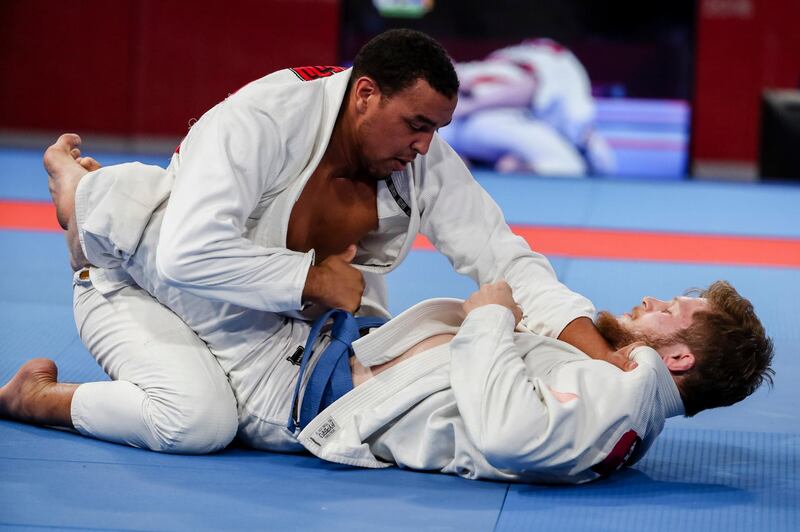Leading jiu-jitsu figures are confident the success achieved at the Asian Games will boost the martial art’s hopes of inclusion at the 2024 Olympics in Paris.
More than 200 fighters from 28 countries competed in the eight jiu-jitsu events – six for men, two for women – at the Jakarta Convention Centre from August 24 to 26. The UAE topped the medals table with two golds, five silvers and two bronze.
It was the first time jiu-jitsu has been included in the Asian Games, and while it’s place at the 2022 Games in Hangzhou, China is yet to be confirmed, it is thought to be a formality.
____________
Read more:
Emirati Women's Day: Mahra Al Hanaei and Ashwaq Al Koori set example at Asian Games
Asian Games: Khalfan Belhoul 'a hero' for fighting though the pain to guarantee UAE a medal
'A dream come true': UAE's Faisal Al Ketbi wins jiu-jitsu gold at 2018 Asian Games
____________
In the five years since the Jiu-Jitsu Asian Union was formed, the sport has made great strides in terms of inclusion at major events. As well as participation at the Asian Games, jiu-jitsu was present at the Asian Indoor and Martial Arts Games in Turkmenistan last year, the last two editions of the Asian Beach Games in Thailand (2014) and Vietnam (2016), and the World Games in Poland in 2017. It has also been included in next year’s inaugural World Beach Games in San Diego.
With 29 of the 36 Asian national federations involved at the Asian Games, the jiu-jitsu community is fast-expanding, which only bodes well for the sport’s future, according to Panagiotis Theodoropoulos, president of the Jiu-Jitsu International Federation.
“It’s happening five years after the formation of the Jiu-Jitsu Asian Union (JJAU),” Theodoropoulos said in Jakarta.
“We had 70 per cent of the Asian countries representing the sport at the Asian Games. It’s not only about the medals but we have established a jiu-jitsu family in Asia.”
Despite the progress made in recent years, Theodoropoulos said there is still “a lot of work to do” for jiu-jitsu to achieve its Olympic aspirations.
“It’s not only representing the sport at the Asian Games but there is a lot of other work, but it’s realistically possible,” he said. “However, we want jiu-jitsu to be included in the Olympics without losing our friendships and our values of our sport.
“Our sport is the biggest in martial arts in terms of numbers and competitions, which we have almost every week around the world throughout the year.
“We have very good representation from the five continents. We have programs in our sports for violence, doping and betting.
“We have participated in the World Games, Asian Games and Asian Indoor and several championships around the world every year. They are successful too.
“We are launching a new project in September, to have both a school and a university championship. Our sport is still growing despite the success we have had and that’s very encouraging.”
Fahad Ali Al Shamsi, general secretary of both JJAU and the UAE Jiu-Jitsu Federation, is confident the sport will remain in the Asian Games.
“We started from the top - more so than many other sports at the Games,” he said. “We had more countries and more entries, and more importantly we witnessed high level fights and close results.
“This is very encouraging in terms of the sport returning to the Asian Games four years from now. We have accomplished one of our objectives and the next will begin as soon we touch base.
“We will be looking at 2022 and beyond and try to increase the number of golds from eight in Jakarta.”
Lee Hee-sung, president of the Korea Brazilian Jiu-Jitsu Confederation, has seen a sudden jiu-jitsu boom in Korea.
Sung Ki-ra bagged one of the two gold medals on offer for women, while Hwang Myeng-se took a men’s bronze for Korea.
“The growth in the last three years has been phenomenal,” Hee-suung said. “I believe this trend will continue. I can’t imagine the impact it will create in Korea in another four years.”






